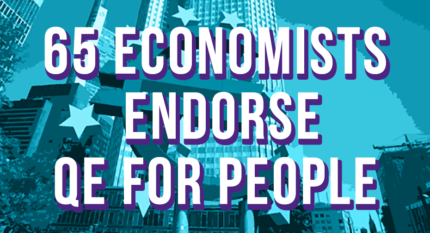While the European Central Bank is expected to announce more quantitative easing after its meeting today in Frankfurt, more than 65 economists have signed a statement of support for a new approach.
Despite significant evidence that QE is not working, the European Central Bank’s Governing Council is expected to decide today to extend and boost its QE program. At the same time, more than 65 economists are calling on the ECB to adopt a different approach and have signed up to the following statement arguing for QE for People:
1. Conventional QE does not work
Since it started in March, the eurozone QE program has not helped to rescue the eurozone economies from stagnation.
2. Conventional QE is risky and harmful
Flooding financial markets inflates share and bond prices, which makes the rich richer, but does little to help ordinary people and businesses. In fact, QE is helping fuel a new financial bubble, laying the foundation for another financial crisis.
3. A more direct approach is needed
Countries in the eurozone need to stimulate their economies without increasing public and private debt, without increasing inequality, and without creating bubbles.
4. QE for People is possible
Instead of flooding financial markets, money created through QE should be spent into the real economy, on essential public investment such as green infrastructure, affordable housing and/or distributed as a citizens’ dividend to all residents.
5. QE for People is urgently needed
Given the challenges facing the eurozone, we urge economists, civil society organisations, and people from across the eurozone to join us in calling on the ECB to implement QE for People as soon as possible.
The list of signatories (pdf) include several of the pioneers of this idea such as Professor Steve Keen, Professor David Graeber, and fund manager Eric Lonergan.
A better way for the ECB to achieve its mandate
“Such bold measures are much more likely to boost growth and economic activity, and ultimately make the ECB reach its inflation target than the current quantitative easing program” said Patrizio Lainà, former Economist at the Central Bank of Finland and currently researcher at University of Helsinki.
“In the past, monetary financing was dismissed by many because of the highly inflationary risk such policy entails. But right now such risk is close to zero. The effects of QE for People could be closely monitored by central banks – and adjusted if necessary” said Brian M Lucey, Professor of Finance.
In September, Mario Draghi made a statement in the European Parliament, arguing that the ECB had been part of discussion about these ideas, but legal aspects needed to be checked before the ECB could think about making of this policy tool.
“It may sound like a radical idea, but policymakers in Frankfurt and Brussels may soon realize they don’t have so many other options in their toolkits to prevent the euro area economy from sliding into stagnation. It is time to have a serious discussion about QE for People to address existing bottlenecks in terms of household debt, sluggish growth and high unemployment” said Constantin Gurdgiev, from Trinity College of Dublin.
The campaign for Quantitative Easing for People is currently supported by 21 organisations and aims to redirect money created through the QE programme to the real economy by either financing public investment spendings in the eurozone or by distributing a citizens’ dividend to all residents in the eurozone.
In March 2015, 19 economists had already signed a letter to the Financial Times making a similar call. “Having 65 economists endorsing the idea is a huge milestone, but this is only the beginning. Our goal is to create a much bigger coalition with citizens, academics and civil society organisations” said Stan Jourdan, campaign coordinator.
• Citizens can join the movement for QE for People by signing up here.
• Economists can join the call by endorsing the campaign here.

